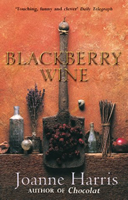Introduction
 What if you could bottle a year of your past? Which one would it be? Which time of year? What would it smell like? How would it taste?
What if you could bottle a year of your past? Which one would it be? Which time of year? What would it smell like? How would it taste?
These are the questions which began Blackberry Wine: the second volume of my “food trilogy” and the story of Jay Mackintosh, a writer of pulp fiction with one literary success to his name and a dwindling grasp of reality. Trapped between an unresolved past and a humdrum present, suffering from writer’s block and the beginnings of alcoholism, Jay has lost his bearings.
But the accidental discovery of six bottles of home-brewed wine, a legacy from an old and vanished friend, seems to hold the key to a new beginning, a means of escape, and a final reconciliation. For there is something magical about this wine; something which brings the past to life, an agent of transformation. Under its influence, time can work backwards and the dead return to life – as Jay finds, when, on impulse, he gives up his glamorous London lifestyle and escapes to a half-derelict farmhouse in a remote village in Gascony, where two mysteries await him; a ghost from the past whom no-one else can see, and Marise, a reclusive widow with ghosts of her own…
Background
I finished Blackberry Wine before the publication of Chocolat. I’m relieved it happened that way, because if I had been able to foresee the success of Chocolat I might well have ended up like Jay, completely frozen by his own achievement and unable to write anything serious again. Fortunately I have rather more to keep me grounded in the real world than Jay – living with an eight-year-old is a terrific antidote to living in the past – and I tried not to think too much about Chocolat as I was writing, knowing that all literary successes are heavily dogged by the curse of expectation.
Having said that, Blackberry Wine ended up being a kind of companion piece to Chocolat after all. It wasn’t intended that way, but there are recurring themes (food/wine as an agent of transformation, magic, life in a small community) which link the two books. In addition, the principal setting of Blackberry Wine is the same village which I used in Chocolat, and it seemed natural to have some of the same characters. It is not, however, a sequel. It is a relative – a second cousin, perhaps – and therefore shares similar genes.
While Chocolat began as the story of my maternal great-grandmother (who turns up as Armande in the book, and as a photograph on the back cover), Blackberry Wine is very much about my paternal grandfather. The character of Jackapple Joe Cox, gardener, Yorkshireman, ex-miner, amateur magician and seeker after wider vistas, is closely based on him, and it is he who forms the backbone of the story. He’s there on the back cover, too; aged five or six, sitting on his father’s knee. Born into a coal-mining family in the north of England, my grandfather was a natural gardener and loved growing things, although his own father saw much of it as a waste of time and only tolerated “useful” gardening (ie: the cultivation of food). Following his father and brothers down the mines, he worked there for some years before finding a dream job as head gardener in a local stately home. When the war arrived he tried to enlist in the army, but was told that because of a hand injury sustained down the mine, he was unfit for active service. So he volunteered to return to coal mining, giving up the job he loved, and when the war ended, he discovered that he had unwittingly signed up for another thirty years.
On retirement, however, he went back to gardening. He and my grandmother had bought a corner sweet shop (where my parents lived for a while and in which I was born), and he had an allotment alongside, in which he used to grow all kinds of fruit and vegetables. My earliest memories are of this allotment and the plants which grew there in cold-frames built out of reclaimed junk, with the radio hanging on a tree branch and myself sucking rhubarb sticks and listening to stories. I remember my grandfather making jam and preserves, and how the house always smelt of things cooking or pickling or fermenting. Best of all I remember his wine. Much of it was experimental and therefore undrinkable (peapod, potato, or parsnip), but some was quite good. He kept it in demi-johns in the back bedroom, and rarely drank anything else. When I went to university he would always give me half a dozen bottles of his home-made wine at the beginning of the year, and my grandmother would send me fruit cake or jars of jam during the term. It was like a taste of home.
When my grandfather died, ten years ago, I picked up a few of his remaining bottles from the pantry. Jay was braver than I am – I still haven’t opened them.
Reading this book as part of a discussion group? Get the reading group guide here!
